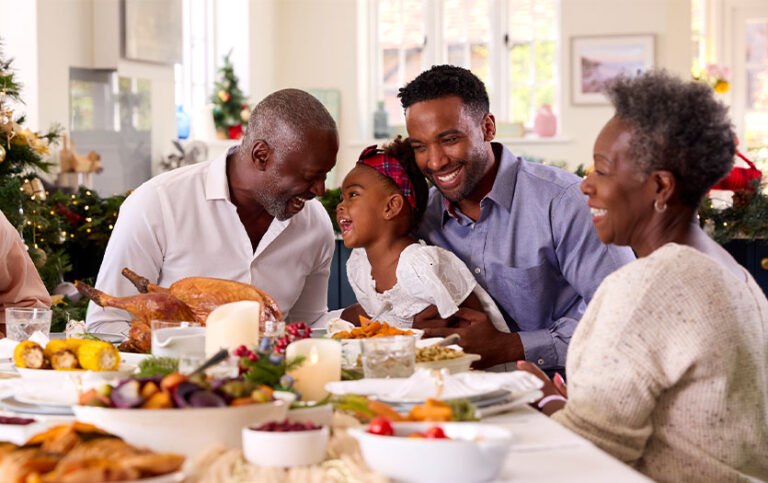
This article was written by Judy Tillapaugh, RDN, LD, CPT, Registered Dietitian, Parkview Behavioral Health Institute Eating Disorder Program.
Every fall, my mother’s favorite festive questions were: “What would you like for Christmas?” and “What would you like me to do?” She and Dad so enjoyed giving gifts and sharing meals with family and friends. They saved throughout the year to buy personal gifts, delicious meals, and eat delicious desserts during the holidays. The holiday spirit was still rich in their thoughts and actions as they conveyed their love and peace.
Yet many of the most meaningful family moments were priceless and didn’t come packaged in a box or on a colorful plate. What is always remembered and cherished is the time spent baking and decorating holiday cookies, Mom filling the house with the fresh smells of baked bread and Dad telling farm stories around the table .
This time of year can be challenging as various meal and snack stressors arise. You might feel fear of overeating, shame over breaking a food rule, or guilt after eating something considered “junk” or “unhealthy.” It can feel overwhelming, leaving little room for the peace and love of the season.
This holiday season, consider planning your presence differently. Invite yourself to enjoy a satisfying, diet-free season by preparing intuitive, gentle nutritional choices. Consider it a gift that you continually give. Here are some tips on how to use intuitive eating during the holidays and beyond.
The gifts of intuitive eating
Gift of not talking about diet
- Request that no diets be used during vacations.
- Ask that no one at home talks about diets without weight control, health foods, calorie counting and fitness trackers.
- Encourage the family to come to meals with a topic for discussion or a question to ask the group.
Gift of making peace with food
- Give yourself permission to eat the foods you love at meals and snacks. Denying yourself can lead to intense feelings of deprivation that could turn into envy.
- Prepare or order traditional or new holiday appetizers, entrees, sides and desserts.
Gift for challenging the food police
- Undo the labeling of foods as “good” or “bad” because of unrealistic, false, and guilt-inducing rules that likely started with dieting.
- Use positive self-talk when preparing and eating meals to avoid negative, bullying thoughts.
Gift of discovering the satisfaction factor
- Create and enjoy positive, supportive eating experiences without cell phones or other electronic devices. Instead, consider having table decorations, ambient music and conversations.
- Eat mindfully, be present and notice the pleasure of smells, tastes and textures.
Gift of handling emotions with kindness
- Plan a variety of foods that you and everyone in your family enjoy. Involve everyone in planning and preparing the menu. Realize that food restrictions, both physical and emotional, can lead to a loss of control over eating and additional emotions.
- Welcome all the holiday feelings. Talk and/or write about enthusiasm, joy, peace and other feelings. Use coping and calming ideas if necessary to relieve feelings of stress.
Gift of respecting your body
- Stop body checking because it leads to body dissatisfaction. We all have our own special qualities. When spending time with family, friends, and coworkers, focus on qualities like their personality, skills, talents, and kindness.
- Stop denigrating self-talk and replace it with empowering statements such as “My legs keep me moving,” “My creative thoughts help us do festive activities,” or “My listening ear will calm others.”
- Do nice things for yourself daily, like breathing deeply, using a meditation or inspiration app, taking a calming bath, or trying a new hairstyle.
Gift of positive movement
- Include festive and enjoyable activities before or after meals and snacks, such as singing and moving to holiday music, taking a walk or bike ride to admire holiday lights, or playing with your children.
- Offer to do vacation home maintenance (like laundry and dishes), lawn care, and/or decorating.
This holiday season, give yourself the gift of intuitive eating principles. You can learn more about intuitive eating at IntutiveEating.org.
Let us help you
Our relationship with food can sometimes be difficult, irregular, guilt-inducing and can lead to an eating disorder. If you feel like you or someone you know might be dealing with a eating disorder or eating disorders, the team at Parkview Behavioral Health Institute can help. Our specialists eating disorder program is designed to support individuals and families in their healing journey. Recovery is truly possible. For an evaluation, call 260-481-2700.
